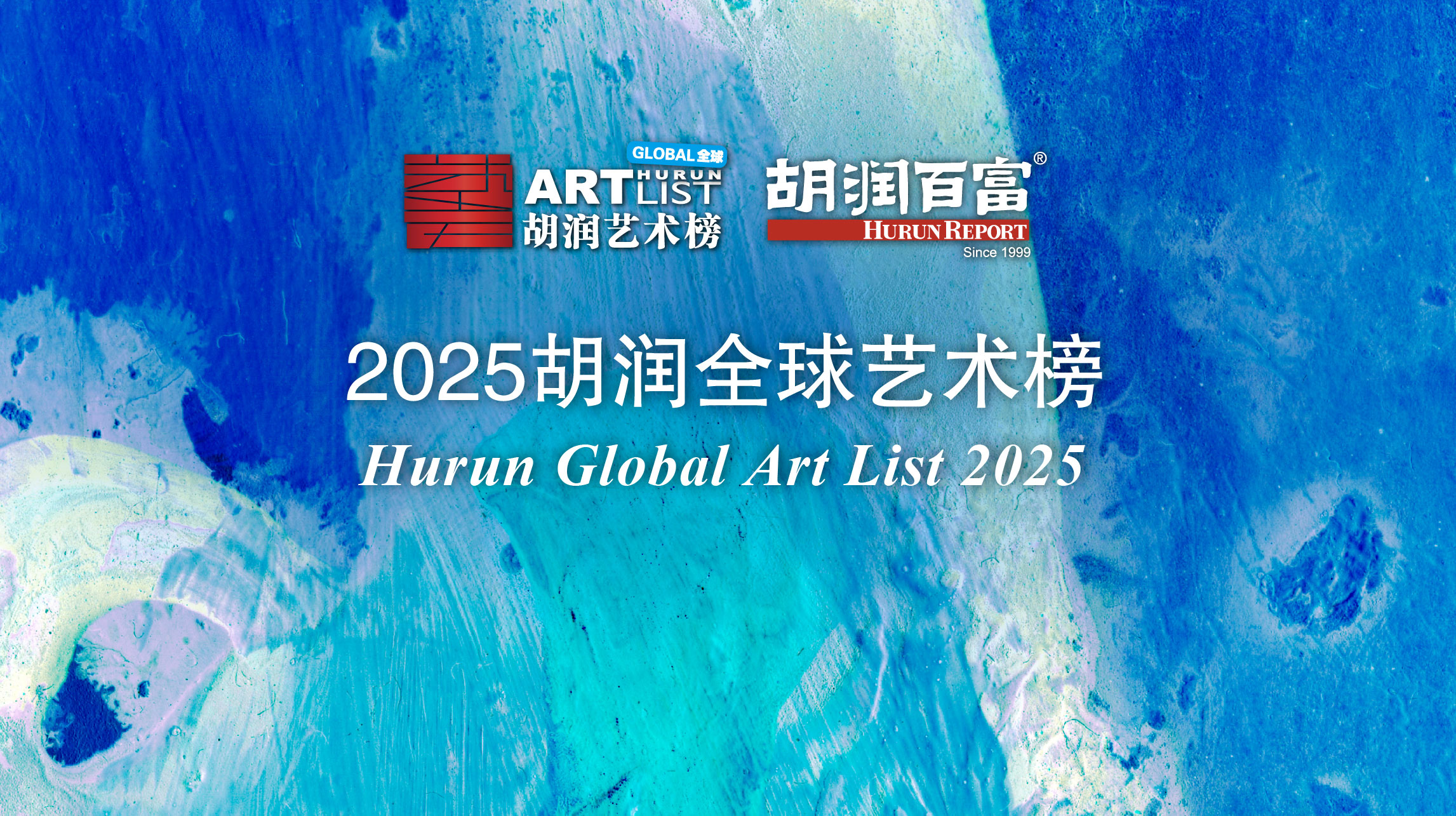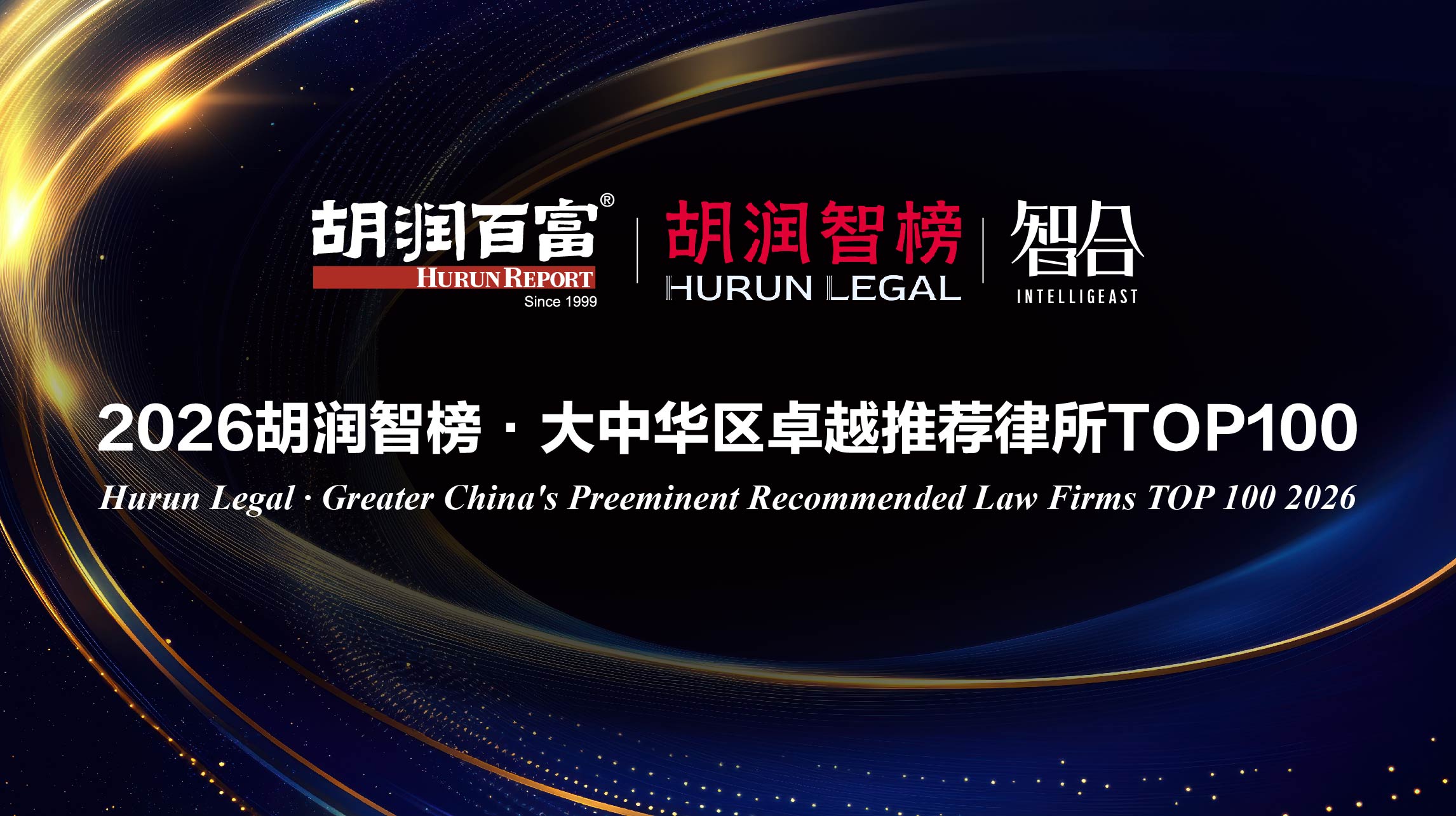Hurun China Rich List 2025
The Hurun Research Institute today released, in association with premium baijiu brand Hengchang Shaofang, the Hurun China Rich List 2025, a ranking of the richest individuals in China. The cut-off was CNY 5 billion (equivalent to US$700 million), and wealth calculations were from 1 September. This is the 27th year of the list.
The Hurun Research Institute releases Hurun China Rich List 2025, in association with premium baijiu brand Hengchang Shaofang. This is the 27th edition of the list since 1999.
Entrepreneurs representing China’s ‘New Productive Forces’ rise to the Top

l Hurun Research found 1,434 individuals with more than CNY 5 billion (equivalent to US$700 million), up 31% or 340 individuals from last year. Total wealth increased 42% to US$4.2tn. Number of dollar billionaires up 268 to 1021.
l ‘Bottled Water King’ Zhong Shanshan, 71, won back the title of ‘Richest Person in China’ for the fourth time in five years, with US$74.3bn on the back of continued growth in his bottled water brand Nongfu Spring, his tea drink Oriental Leaf and a boom in his HPV vaccine for women.
l Last year’s Number One Zhang Yiming, 42, dropped down to second, despite a 34% surge in his wealth to US$65.9bn. ByteDance has invested heavily into AI. Its AI assistant ‘Doubao’ now has with 160 million monthly active users.
l Pony Ma Huateng, 54, kept his Top 3 place, with US$65.2bn, as Tencent enjoyed a strong year. Tencent's advertising revenue grew by 20%, its domestic gaming business increased by 10%, the GMV of WeChat Mini Stores nearly doubled and its annual net profit rose by 68%.
l The three fastest risers of the year were Lei Jun of Xiaomi, up US$27.5bn, Grant Wang Ning, 38, of the wildly popular Labubu maker Pop Mart, up US$21.7bn, and Chen Tianshi, 40, of chip maker Cambricon, up US$20.8bn.
l 376 new faces, seven times the number of new faces last year, led by Xu Gaoming, 61, & Xu Dongbo of Beijing-based luxury brand Laopu Gold with US$9.7bn. The second highest new entry was Li Qibin, 52, & Qi Yan, 52, of Beijing-based collectable trading cards business Kayou, with US$8.4bn. Both Xu and Li broke straight into the Hurun Top 100. The youngest new faces included JK Liu Jingkang, 34, & Pan Yao, of social media cameras brand Insta360 with US$5.4bn. Bubble tea brands have had an amazing year, led by Wang Yun’an, 38, of Good Me with US$2.6bn, Zhang Junjie, 30, of Chagee with US$1.9bn, Shan Weijun, 47, & Zhou Rongrong, 46, of Auntea with US$1.3bn.
l It’s been a great year for New Energy Vehicles, Consumer Electronics, Consumer Brands, Computing Power, Pharma and Stock Trading Software.
l Preferred places to live. Beijing lost its crown for the first time in 14 years, overtaken by not just Shanghai but also Shenzhen. Hong Kong and Hangzhou made up the Big 5, followed by Guangzhou, Taipei and Suzhou.
l Women make up 22.4% of the Hurun list, down 1.1%. Over 70% are self-made, led by Zhong Huijuan of pharma giant Hansoh. Kelly Zong Fuli of Wahaha was the richest NextGen.
l By region, those born in Zhejiang led the way with 208, followed by Guangdong 134 and Jiangsu 109. Broken down further, there were 39 from Chaozhou, 32 from Wenzhou, 28 from Ningbo and 24 from Shaoxing.
l Delegates to the NPC or CPPCC were down from 7% of the Hurun list last year to 6% this year. 44 delegates to the NPC, up 8, whilst 41 were delegates to the CPPCC, up 2.
(28 October 2025, Shanghai) The Hurun Research Institute today released, in association with premium baijiu brand Hengchang Shaofang, the Hurun China Rich List 2025, a ranking of the richest individuals in China. The cut-off was CNY 5 billion (equivalent to US$700 million), and wealth calculations were from 1 September. This is the 27th year of the list.
This is a brief translation from the original Chinese-language press release, which can be found on www.hurun.net.
Hurun Research found 1,434 individuals with more than CNY 5 billion (equivalent to US$700 million), up 31% or 340 individuals from last year. Total wealth increased 42% to US$4.2tn. 1,198 saw their wealth increase, of which 376 were new faces. 276 saw their wealth decrease or remain unchanged, of which 38 dropped off the list. The Top 3 cities with the highest concentration of entrepreneurs on the list were Shanghai, Shenzhen and Beijing. The average age was 60.
It’s been a strong year for the China markets with the Shenzhen index up 54%, Shanghai up 36% and HK up 42%. Nasdaq was up 20% and Bitcoin up 79%. The exchange rate between the renminbi and US dollar was basically flat.
Rupert Hoogewerf, Hurun Report Chairman and Chief Researcher, said:
“I am delighted to be partnering with Hengchang Shaofang, a premium baijiu brand from the town of Maotai in Guizhou province, for the sixth year running, and am much looking forward to hosting our annual Hurun China Respected Entrepreneurs Conference and Awards dinner in the newly opened Hengchang InterContinental Hotel there, especially since most Chinese entrepreneurs love Kweichow Moutai, China’s best-known baijiu brand, but have never been to this legendary town before. Hengchang Shaofang has a history going back almost 100 years in the town of Maotai, the heart of the popular ‘jiangxiang baijiu’.”
“China’s richest have bounced back big-time, as local stock markets soared 50%, led by new energy cars and consumer electronics, as well as a maturing of going global. They are now hitting the heights of 2021 again, more than making up for the falls of the previous three years. This year we managed to find just over 1430 individuals with more than US$700mn, just a little shy of the record set in 2021 of just over 1460.”
“How to explain the massive rise of the Hurun China Rich Listers, at a time when the China economy is flat? At the heart of this difference is that their wealth is largely tied to the value of their businesses and the value of these businesses is based on their future profit-making ability. Investors in the past year have recognized that many of these businesses have a much more potential than previously expected. Many of the companies behind the Hurun Rich Listers are now seen as strong in innovation, spending much on R&D, with an efficient management and cost control, resulting in them being globally highly competitive.”
“There has been a changing of the guard. As many as two thirds of this year’s list were not even on the list ten years ago. The new guard are from industrial products, healthcare and consumer goods, while real estate has gone through tough times. As little as seven years ago, a third of the Hurun Top 100 was made up of real estate developers. Today, there is only one left in the Top 100, and that is Wu Yajun of Longfor, who just makes the cut at Number 99.”
“This year has been a year when the biggest representatives of China’s ‘new productive forces’ have come to the fore. Five of the Hurun Top 10 and 60% of the Hurun Top 100 are doing high quality production, represented by figures such as Zeng Yuqun of CATL, Lei Jun of Xiaomi, Li Shufu of Geely, Wang Chuanfu of BYD and Chen Tianshi of Cambricon.”
“It’s hard to think that a bottled water maker could top the Hurun China Rich List in 2025, in the era of AI and smart manufacturing. Nobody, however, better exemplifies the giant consumer market of China than Zhong Shanshan, 71, who has topped the list for the fourth time in five years and has set a new China wealth record of US$74.3bn. 80% of Zhong’s wealth is from bottled water brand Nongfu Spring, which has surged in value as Zhong has pushed it up the value chain, gradually upping his prices and adding in more premium tea drink brands. He has also seen a boom in his HPV vaccine for women. Curiously Zhong is from the same town in Zhejiang called Shaoxing as Jack Ma of Alibaba, meaning that Shaoxing has now topped the list for seven of the last eight years.”
“It’s been a great year for entrepreneurs making new energy vehicles, consumer electronics, consumer products, computing power, pharmaceuticals, as well as stock trading software.”
“New Energy Vehicles represent the competitive strength of China’s smart manufacturing. Robin Zeng Yuqun of battery maker and energy storage provider CATL and Lei Jun of Xiaomi, both saw their wealth grew by over US$20bn.”
“For Consumer Electronics, this year’s young power couple are JK Liu Jingkang, 34, and Pan Yao, founders of Insta360. They have made inroads into social media cameras that Frank Wang Tao, 45, of DJI has dominated for years. Some of the biggest risers were in the supply chain, led by Zhou Qunfei & husband Zheng Junlong of Lens, up US$15.6bn and a place in the Top 50. The convergence of NEVs with consumer electronics is setting these entrepreneurs up to become big players in robotics.”
“Grant Wang Ning, 38, of Pop Mart is the face of the new generation of innovative consumer brands with a global market, seeing his wealth rise six-fold to a Top 20 place with US$25.5bn. His Labubu toy has stormed the world. Another to watch are Li Qibin & Qi Yan of Kayou, a trading card business, that has shot them straight into the Top 100 with US$8.42bn. Tea-based drinks brands have had an amazing year, none more so than Zhang Junjie, 30, of Chagee, the youngest self-made entrepreneur on the list this year with US$1.9bn. Then there’s Xu Gaoming, 61, who broke straight into the Top 100 with US$9.75bn as Laopu Gold has built itself a reputation of being a luxury jewelry brand, perhaps the first to come out of China.”
“Riding the AI wave that has swept the globe, Chen Tianshi, 40, of Cambricon, often spoken as ‘China's Nvidia’, saw his wealth up five-fold to US$25bn and a Top 20 spot. Others include Chen Tao & Liu Chunlan of Victory Giant, a printed circuit board manufacturer, who broke into the Top 100, and Yang Zhilin, 32, founder of Kimi, one of China’s answers to ChatGPT.”
“Within healthcare, particularly the innovative drug segment, several entrepreneurs focusing on anticancer therapies have seen significant wealth growth, led by Zhong Huijuan of Hansoh, up US$8.4bn to US$19.8bn and a Hurun Top 30 spot and Zhu Yi of Biokin Pharmaceutical, also more than doubling his wealth to US$16.1bn and a Hurun Top 30 spot. Zhong and Zhu have both started licensing drugs to the global pharma giants, showing how China’s R&D is paying off. Tse Ping & family of Sino Biopharmaceutical also more than doubled his wealth to US$11.4bn and a Top 60 place. Sun Piaoyang of Hengrui increased his wealth by more than US$4.2bn. Additionally, Yat-Gai Au, founder of Regencell, which specializes in treatments for neurological cognitive disorders and degenerative diseases, made his debut on the list with a fortune US$6.17bn.”
“It’s been a good year for the entrepreneurs behind the stock trading platforms, led by Qi Shi of East Money, Yi Zheng of Flush.com and Li Hua of Futu Holdings, who broke into the Top 70 with over US$10bn each.”
“China now commands 30% of global manufacturing and a number of the Hurun Rich Listers are playing an important part of this new wave of ‘Going Global’. One in six of this year’s Hurun list are generating more than 50% of their sales from overseas markets, led by SE Asia and Europe. Wang Laichun of Luxshare Precision, Wang Chuanfu of BYD, and Ren Zhengfei of Huawei, Lei Jun of Xiaomi, Zeng Yuqun of CATL and He Xiangjian of Midea, now have overseas sales of over US$20bn. Fast-growing brands like Frank Wang’s DJI, JK Liu’s Insta360, Yang Meng’s Anker, Yu Hao’s Dreame and Richard Chang’s Roborock are ones to watch.”
“‘Old money’ in China, that we define as families with investable wealth of over CNY 100mn before the stock market boom of 2007, accounts for 40% of the Hurun list. By comparison, ‘old money’ in the UK typically refers to families that made their wealth over three hundred years, whilst in the US, ‘old money’ is represented by families like the Rockefellers and Carnegies from the late 19th century.”
“A notable trend this year has been entrepreneurs pursuing secondary listings in Hong Kong, allowing them to tap into global markets more easily. Over the past year, businesses led by 8 entrepreneurs on the list have completed such listings, with notable examples including Zeng Yuqun's CATL, He Xiangjian's Midea, and Wang Wei's SF Express.”
“The youngest self-made billionaire is Zhang Junjie, 30, of Chagee, an orphan at 10, who lived on the streets until 17, only taught himself to read and write aged 18 and then founded Chagee aged 22. Seven others are self-made and aged 35 or under, led by JK Liu Jingkang, 34, of Arashi Vision, Nie Yunchen, 34, of Heytea, Lu Jianxia, 32, of Manner Coffee, Yang Zhilin, 32, of Kimi AI, Singapore-based Justin Sun, 35, of crypto Tron and Seattle-based Wang Shuo, 35, of cross-border HR platform Deel.”
“The average age of the listed entrepreneurs is 60, with their children averaging in their early 30s. The number of NextGen successors on this year's list has reached a record high, indicating that Chinese family wealth has officially entered a phase of large-scale inheritance. Kelly Zong Fuli, 43, of Wahaha, who made the Top 50 with US$12.3bn, has hit the headlines recently after stepping down from all her positions within the Wahaha Group and announcing she is thinking of setting up a competitor brand to Wahaha called ‘Waxiaozong’. At the same time, it has emerged that her late father Zong Qinghou had several love children.”
“Who are the candidates for China Number One on future Hurun Rich Lists? Top are Robin Zeng of CATL and Lei Jun of Xiaomi, who have significant potential for further growth as NEVs and the era of robots mature. Others include CZ Zhao of crypto currency trading platform Binance, as crypto and stable coins evolve. A dark horse is Liang Wenfeng, 40, the man behind DeepSeek. Liang has not even made the list yet, but were DeepSeek to start commercializing its platform, it would make Liang a potential candidate for Number One, in three to five years.”
“The concentration of wealth continues. The number of individuals with wealth of CNY100bn or more was up from zero over a decade ago to more than 40 today, while the number of those with CNY10bn or more has surged from next to nothing 20 years ago to 750. At this rate, expect China’s first CNY trillionaires within five years, perhaps even as fast as three years.”
“Philanthropy and wealth creation go hand in hand. 13 entrepreneurs from the Hurun List have made donations of over CNY10bn, led by Pinduoduo's Colin Huang Zheng and Tencent's Pony Ma Huateng, whose donations are now risen in value to over CNY50bn, and Xiaomi's Lei Jun CNY30bn. The Hurun China Philanthropy List is coming out next week for the 22nd year running.”
“Xiaomi's Lei Jun is this year’s ‘top influencer’, with tens of millions of followers. Others include New Oriental's Yu Minhong and 360's Zhou Hongyi. There is a trend in big entrepreneurs doing social media to save corporate marketing costs. The fast growth of Xiaomi's automobile business, for example, is partly attributed to Lei Jun's personal social media.”
“Those born in the Year of the Rabbit make the best entrepreneurs, topping the Hurun List for most of the past 20 years, and that is despite the names of the list changing dramatically, with two thirds of this year’s list not even making the list ten years ago. Examples include 62-year-old Li Shufu of Geely and 38-year-old Wang Ning of Pop Mart. Sandwiched between Tigers and Dragons, those born in the Year of the Rabbit were perhaps the best age to take advantage of the booms in wealth creation of 1993, after Deng Xiaoping’s Southern tour, of the second internet boom of 2005 and the consumer brand boom of 2015.”
“Since our cut-off date of 1 September 2025, new energy have seen their share values rise with the likes of Zeng Yuqun of CATL up US$8bn, although this would not have changed his ranking.”
“Hurun Report has been promoting entrepreneurship through its lists and research since 1999. You can think of the rich list as an annual snapshot of China's private sector with the stories of these entrepreneurs telling the story of China's economy. I would like to thank our title sponsor Hengchang Shaofang, a premium baijiu brand from the Maotai region, for partnering with us for the sixth year running.”
Deng Hong, founder of Global Center and Hengchang Shaofang, said:
“The ultimate competition between brands is a competition of culture. In an era where traffic is king, Hengchang Shaofang must both ride the wave of new technologies and return to the cultural foundation of the brand. To this end, Hengchang Shaofang is actively integrating innovative technologies like AI to empower every aspect of its operations, from production control and brand communication to sales and service. By leveraging short-form video and social media platforms, the brand has established warm, genuine connections with consumers through authentic life scenarios. This strategy has already led to a significant increase in the proportion of its private domain sales.”
“Traffic is not the end goal but the starting point for building brand culture. Hengchang Shaofang is consistently dedicated to establishing itself as a premium Chinese jiangxiang baijiu brand that is ‘more culturally rich, more artistic, more tasteful, and more distinctive’. The concrete manifestation of this vision is the Hengchang Shaofang Estate, launched in Maotai Town in June this year. The estate integrates a contemporary art center, an InterContinental hotel, and the traditional distillation area of the old brewery. Through immersive experiences such as tours, tastings, and ceremonial cask-sealing, visitors can truly experience a quality lifestyle centered around jiangxiang baijiu, all within an atmosphere steeped in traditional brewing, culture, and art.”
Top 10
Two new faces in the Top 10: Lei Jun of Xiaomi and Li Shufu & family of Geely.
The cutoff to the Top 10 was US$31.6bn, up from US$23.2bn last year. The average age of the Top 10 was 62, 3 years younger than last year. Four of the Top 10 are from Zhejiang, 3 from Guangdong each, 2 from Fujian and 1 from Hubei.
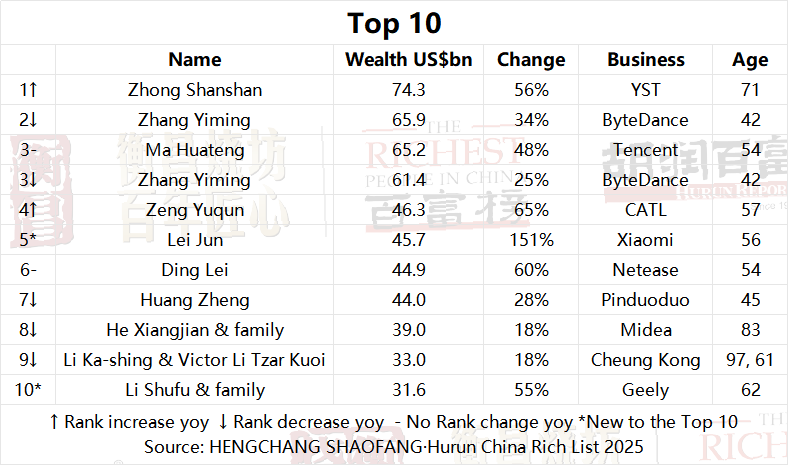
‘Bottled Water King’ Zhong Shanshan, 71, was up one place to become the Richest Person in China for the fourth time, with US$74.3bn on the back of continued growth in his bottled water brand Nongfu Spring, his tea drink Oriental Leaf and a boom in his HPV vaccine for women. In the past year, Zhong received dividends of US$1bn last year.

Last year’s Number One Zhang Yiming, 42, was second, despite a 34% surge in his wealth to US$65.9bn. ByteDance's revenue overtook Meta's for two consecutive quarters. 25% of ByteDance’s revenues were from overseas, with 60% of that coming from TikTok.

Pony Ma Huateng, 54, kept his Top 3 place, with US$65.2bn, as Tencent enjoyed a strong year. Tencent's advertising revenue grew by 20%, its domestic gaming business increased by 10%, the GMV of WeChat Mini Stores nearly doubled and its annual net profit rose by 68%.

Robin Zeng Yuqun, 57, was up two places to 4th with US$46.3bn, up 65%, on the back of a surge in the demand for batteries and energy storage. In May, CATL had its secondary listing on HK, raising over US$4bn in the listing in recent years. Seven individuals from CATL made the list, led by including Robin Zeng and Huang Shilin.

Lei Jun, 56, of Xiaomi was the biggest riser of the year, adding US$27.5bn to break into the Top 5 with US$45.7bn, on the back of explosive growth in his automotive business and a leap in profitability due to breakthroughs in the premium smartphone segment.

Ding Lei, 54, was 6th with US$44.9bn, as NetEase’s gaming business reported a strong year.

Despite Colin Huang Zheng, 45, seeing his wealth up US$9.7bn or 28% to US$44bn, this was not enough to keep in the Top 4, instead slipping down to 7th. Pinduoduo's total revenue in the first half of this year reached US$28bn, an increase of 8.6%, whilst profits dropped 24% to US$6.4bn, on the back of its ‘100 billion yuan’ initiative to enhance the construction of a high-quality e-commerce ecosystem and its expansion of Temu.

He Xiangjian, 83, & family were 8th with US$39bn, up 18%. Midea had another record-breaking year, with revenues hitting US$57.1bn, up 9.4% and completing its HK dual listing with Shanghai.

Li Ka-shing, 97, and his eldest son, Victor Li Tzar Kuoi, saw their wealth increase by US$4.9bn to US$33bn. The investment portfolios of their two main listed companies, CK Hutchison and CK Asset, already cover real estate, retail, telecommunications, infrastructure, ports, and energy.

Li Shufu & family, 62, was back into the Top 10 with US$31.6bn, up 55%, on the back of a doubling in the share price of his HK-listed Geely Automobile, whilst Volvo Cars had a strong year with sales of US$36.5bn.

Biggest risers
1198 saw their wealth increase, of which 376 were new faces, more than the previous three years combined.
Wealth grew significantly over the past year, showing greater confidence in the future profitability of many of China’s biggest companies. The Top 10 Risers added US$192bn of wealth, triple that of last year.
Top 10 Biggest Risers

Top 10 New Faces
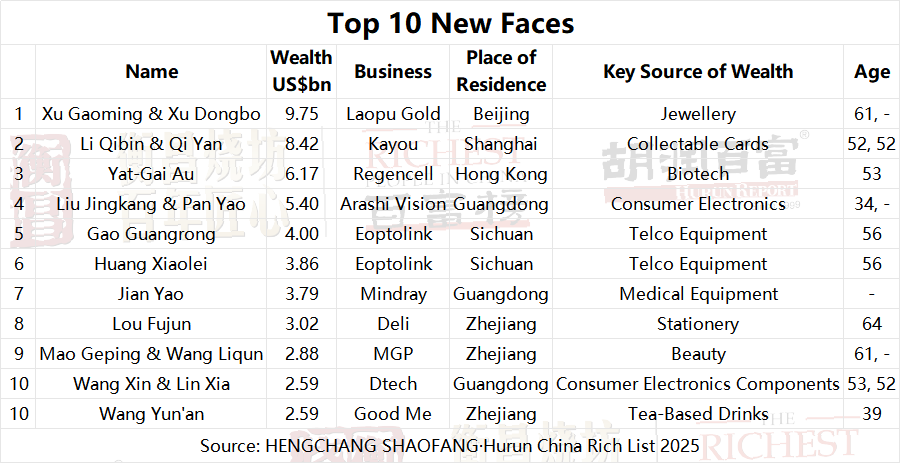








Wealth decrease
276 saw their wealth decrease or remain unchanged, of which 38 dropped off the list.
Xinjiang-based Mi Enhua of Hualing and Sun Guangxin of Guanghui, both had bad years. Real estate continued to face headwinds, with Wang Jianlin of Wanda, Xu Rongmao of Shimao, and Yang Huiyan of Country Garden, all down.
Only 38 dropped off, 163 fewer than last year. The consumer goods industry accounted for the highest proportion, reaching 16%, followed by real estate, accounting for 13%.
Where they live
Shanghai and Shenzhen overtook Beijing for the first time in years. Hong Kong and Hangzhou made up the Big Five. By region, the Yangtze River Delta is the place of choice for 483 or 34% of the list, followed by the Greater Bay Area with 363 or 25%. 224 live in Hong Kong, Macao, Taiwan or overseas.

What Industries are on the up?
Industrial Products was top with 16.5% of the list, up 3.8%, as the supply chains of consumer electronics, cars and robotics grew. Consumer Products was second, accounting for 10.3%, a decrease of 0.7%. Healthcare was 3rd, accounting for 9.8%, an increase of 0.7%. In terms of the proportion of wealth, Consumer Products are still the industry with the highest proportion of wealth, accounting for 11.4%, an increase of 1.5% over last year.

Other ways of looking at Industries
9% of Hurun rich listers are now active in AI. 7.5% in New Energy, 5% in Robotics.

Chinese Star Signs
Those born in the Year of the Rabbit continue to be the best wealth creators, with the most individuals on the Hurun list for an unprecedented 14th year, despite 80% of the list changing in that period. Dragons and Dogs were second and third. Those born in the Year of the Rat had a good year, whilst those born in the Year of the Dragon dropped down the most.
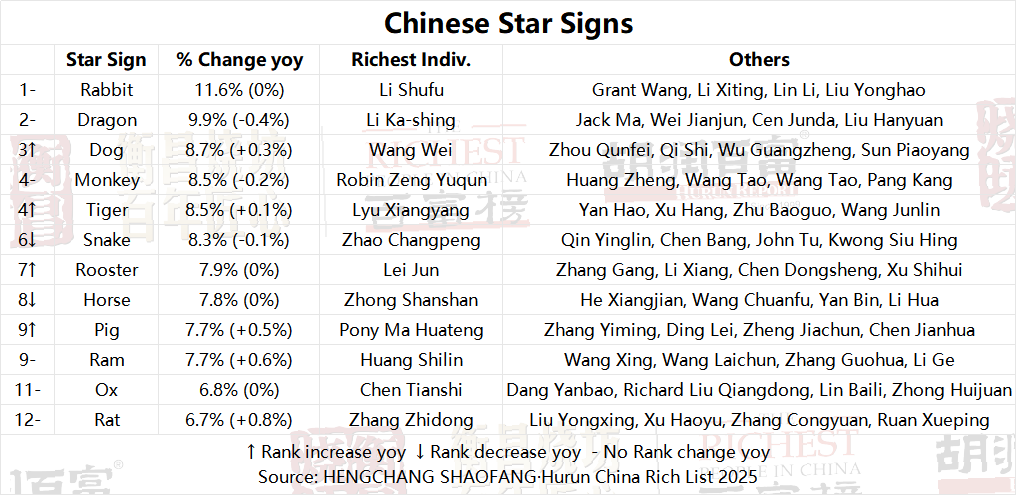
Non-mainlanders
11 individuals from the Hurun China Rich List were born outside of Greater China. Denmark and the US stood out. The richest self-made entrepreneur is Teo Swee Ann of Espressif Systems, a Singapore native who makes chips, and John Oyler of BeiGene, an American who makes anti-cancer drugs.
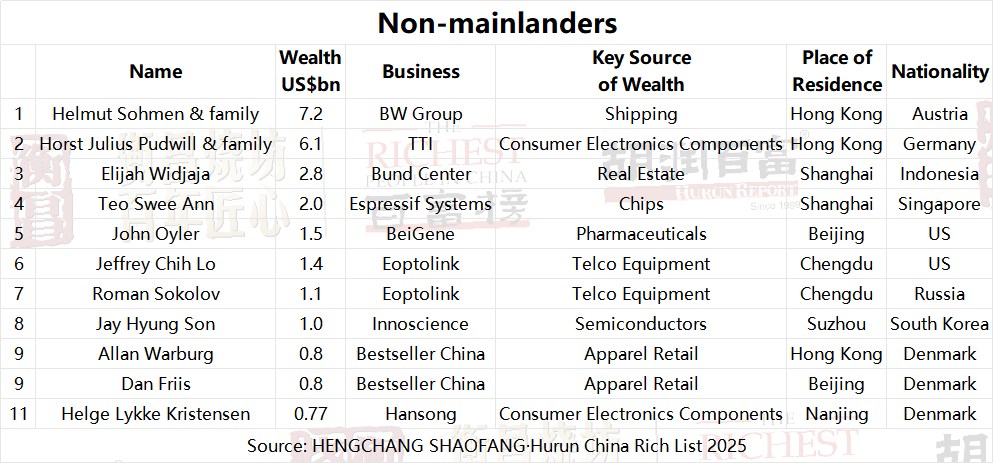
Passed away
4 from last year’s list passed away: Lee Shau Kee of Henderson Land in March at the age of 97; Lui Che Woo of casino operator Galaxy in November at the age of 95; Xu Lianjie of HengAn in April at the age of 72; Wang Linpeng of Easyhome in June at the age of 57.
Stats throughout the years
Cut-offs changes
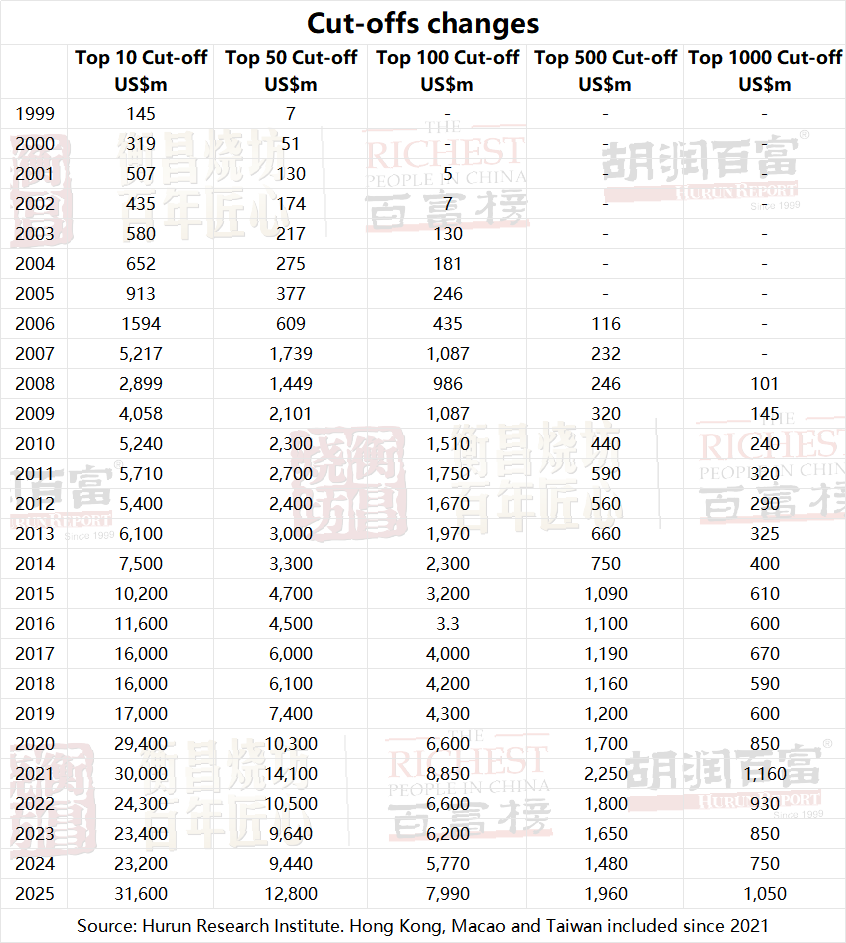
No. of Billionaires and Number Ones
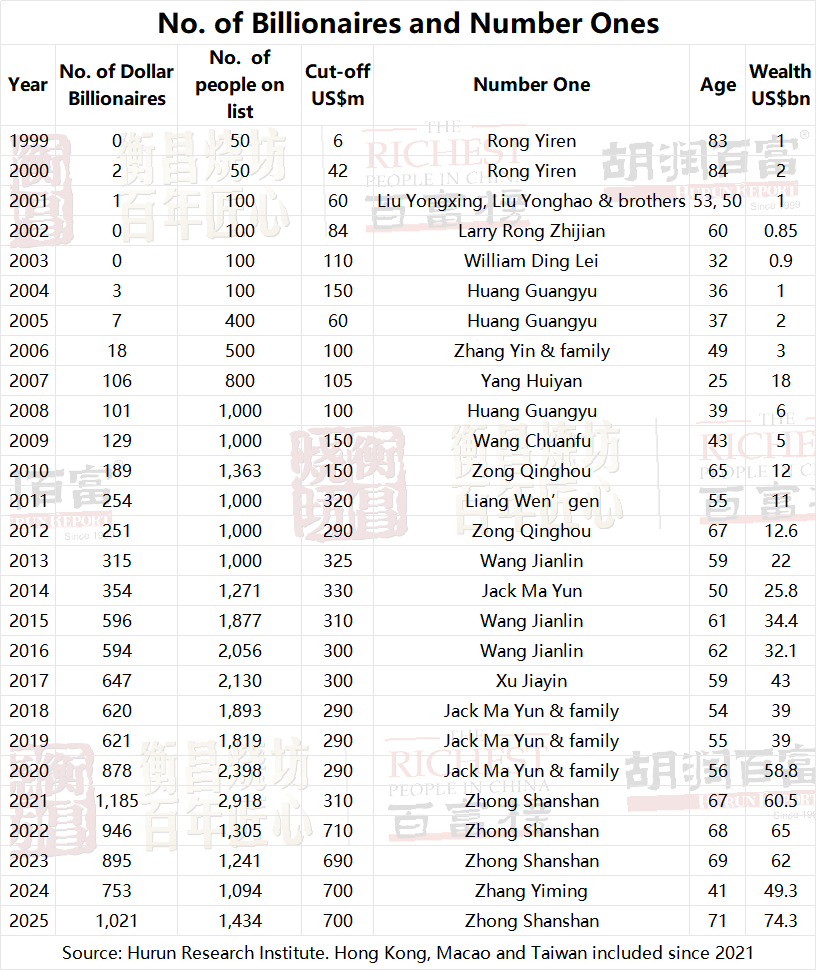
Methodology
The List is a snapshot of wealth as of 1 September 2025. The exchange rate used for the US dollar was CNY 7.13, for the Hong Kong dollar was CNY 0.92, for the New Taiwan Dollar was CNY 0.23.
Valuing the wealth of China’s richest is as much an art as it is a science. We have missed some people, many of whom go to extraordinary lengths to hide their wealth, but we believe the Hurun Rich List to be the most serious attempt to identify China’s top wealth creators and to measure their holdings. There are shareholders missing from the likes of ByteDance, Alibaba, Tencent, and other big companies, where as little as 0.1% ownership of the company might be enough to make our cut. Our team of researchers has - for the 27th year running - traveled the length and breadth of the country cross-checking information with entrepreneurs, local government, industry experts, journalists, bankers and regulators, as well as previous years’ databases. For non-listed companies our valuation was based on a comparison with their listed equivalents using prevailing industry Price/Earnings ratios.
People that ought perhaps to be on the list, but where we cannot find reliable date include the likes of Haier's Zhang Ruimin, PingAn's Peter Ma Mingzhe, and Huawei's Sun Yafang, because they are hidden behind employee stock holdings. Others that made the list that may well be undervalued are the likes of Duan Yongping of BBK, whose shareholdings in Vivo, Oppo and Pinduoduo, are not publically available.
HENGCHANG SHAOFANG · Hurun China Rich List 2025 Top 100

About Global Premium Wines and Spirits Group (GPWS)
GPWS was established in 2017 by Chengdu-based entrepreneur Deng Hong, who made his name with landmark projects including the Jiuzhai Paradise International Convention & Resort Center, Century City New International Convention & Exhibition Center, Chengdu’s massive Global Center, and now HENGCHANG SHAOFANG.
Currently focused on the baijiu sector, Deng is actively integrating, establishing, and partnering with leading baijiu production and distribution enterprises worldwide. The group's strategy is to develop and market influential and representative product brands across various beverage categories, while also pursuing diverse collaborations with premium domestic companies.
Against the backdrop of an increasingly integrated global economy, Deng recognized the immense potential within China's baijiu market. He foresaw that economic growth would drive an evolution in consumer preferences, with a future emphasis shifting decidedly towards product quality.
Strategically planned in its industrial layout, GPWS has established a core baijiu production structure. This model is anchored in Maotai Town, Guizhou, with two key supporting hubs in Qionglai, Sichuan and Luzhou, Sichuan. Each of these three premier production areas specializes in a different baijiu aroma type: jiangxiang and strong-aroma. This strategic setup enables the successful development of a diverse and complementary portfolio of high-quality baijiu brands, catering to the nuanced taste and quality demands of a broad consumer base.
About HENGCHANG SHAOFANG
In 2017, Global Premium Wines and Spirits Group (GPWS) Group acquired Hengchang Shaofang in Maotai Town, initiating a comprehensive plan to revitalize this century-old brand.
Since its operation, Hengchang Shaofang has earned market recognition for its exceptional quality and profound brand heritage. It has consistently adhered to a brand development strategy centered on four key principles: Quality, Brand, Scale, and Long-term Vision. The brand remains steadfastly committed to its long-term objective of ‘Growing Superior Sorghum and Producing Excellent Baijiu’.
In 2021, Hengchang Shaofang achieved sales revenue of RMB 1.5 billion. In response to evolving market dynamics, the company formulated a new strategic roadmap, laying a solid foundation for its future goal of exceeding RMB 10 billion in revenue. Leveraging core IP assets, Hengchang Shaofang collaborated with renowned enterprises such as Zhongyu Holding Group, Hurun Report, Xinchao Media, Zhongxu Education, and Yiyizhongliu to develop co-branded premium products, continually setting trends in China's high-end jiangxiang baijiu market.
That autumn, GPWS acquired Renhuai Xinning Shares and established the Hengchang Shaofang Supply Chain Company. This entity focuses on the storage of base liquor, finished product packaging, and logistics warehousing, ensuring seamless operations across the business chain. Concurrently, advancing its long-term goal of "Growing Superior Sorghum and Producing Excellent Baijiu," and leveraging the advantages of the Chishui River Basin as the origin and primary production area for jiangxiang baijiu, the company began developing a 10,000-ton sorghum planting base in Zunyi City, Guizhou Province, the heart of China's jiangxiang baijiu production.
Entering 2022, Hengchang Shaofang amplified its brand communication efforts. Through partnerships with elevator media giants like Focus Media, Xinchao Media, and City Media, it strategically covered 25 key cities nationwide. Its advertising reached over 1 million elevator frames and digital screens, penetrating nearly 100,000 communities. Deep collaborations were also forged with leading industry media such as Weijiu, Jiuyejia, Tjkx, Phoenix New Media, and Yunjintoutiao, further strengthening the emotional connection between the brand image and its core consumers. This omnichannel empowerment facilitated a rapid transformation, solidifying Hengchang Shaofang status as a veritable super brand. Through these strategic alliances, the brand not only expanded its influence but also accelerated qualitative leaps in supply chain management, product innovation, and market expansion, underscoring its leadership in China's jiangxiang baijiu industry.
In February 2023, construction commenced on the first phase (covering approximately 300 mu) of the Hengchang Shaofang 30,000-ton Production Base in Maotai Town's Chunshu Village, located within the core production area of Chinese jiangxiang baijiu. The total project spans approximately 1,500 mu. This initial phase includes a production zone and Hengchang Shaofang Estate. The Estate features various facilities: the Hengchang Contemporary Art Center, Hengchang InterContinental Hotel, the traditional distillation area of the old brewery, the Hengchang Shaofang Research Institute, a museum, and the Hall of Fame & Cask-Sealing Ceremony area.
In October 2023, Hengchang Shaofang received one of the first Zunyi Production Region Certifications for jiangxiang baijiu, awarded by the Zunyi Market Supervision Administration. It was also honored as a ‘National Model Enterprise for the Safe Alcohol Project’ by the China Liquor Circulation Association, accolades that highlight its exceptional quality and industry standing.
In March 2024, the fourth-generation upgrade of the Hengchang Shaofang Classic Series—Hengchang Shaofang · New Classic—debuted at the 110th National Chengdu Spring Sugar & Wine Fair. The following month, Guizhou Renhuai Maotai Town Hengchang Shaofang Brewery Co., Ltd. and InterContinental Hotels Group (IHG) formed a powerful alliance, signing an agreement for the HENGCHANG InterContinental Hotel project. This landmark partnership marks IHG's entry into Guizhou province. The hotel, featuring 193 uniquely designed luxury rooms, is set to become a new landmark in Maotai Town, offering ultra-five-star services and perfectly blending international hospitality standards with baijiu culture.
At the 2025 Chengdu Spring Sugar & Wine Fair, Hengchang Shaofang collaborated with renowned contemporary Chinese artist Zhou Chunya to launch the ‘Hengchang Shaofang Master Zhou Chunya's Liquor’. This collection includes a 500ml commemorative bottle and a limited-edition 1500ml collector's bottle. The bottle designs for the "Peach Blossom" and "Green Dog" variants draw inspiration from Zhou Chunya's masterpieces "Spring Breeze Balustrade, Dewy Sheen" and "TT Looking Back", respectively. By the end of June 2025, the Hengchang Shaofang Estate in Maotai Town, Renhuai City—the core production area for Chinese jiangxiang baijiu—was officially completed.
Today, Hengchang Shaofang has established a nationwide presence, covering key provinces, Tier 1 and 2 cities, and crucial prefectural-level markets. Provincial platform companies have been established in Sichuan, Jiangsu, Fujian, Yunnan, Shandong, Henan, Tianjin, Xinjiang, Hunan, Guangdong, Liaoning, Heilongjiang, and Shanghai, with expansion into additional key cities ongoing. Furthermore, Jiangxiang Baijiu Tasting Galleries have opened in core cities including Shanghai, Guangzhou, Shenzhen, Chengdu, Zhengzhou, Xi'an, Jinan, Luoyang, Qingdao, Jining, Zibo, Taizhou, Xianyang, and Longnan.
Brand Honors & Awards:
2017 National Liquor Appraisal Committee "Sensory Quality Award"
2019 4th Zunyi Production Region "Red Sorghum Award" - "Tax Contribution Award"
2020 "Golden Jubilee Award" - "Premium Jiangxiang Baijiu Award"
China Liquor Industry Qingyun Award - "Annual Premium Product Award"
2021 Hurun Best of the Best – ‘Premium Jiangxiang Baijiu Star Performer’
China Liquor Industry Golden Zun Award - "Most Promising Brand" & Renhuai City Outstanding Enterprise for Economic and Social Development
2022
"Top 10 Tax-Paying Private Enterprises (Renhuai City)"
"Top 10 Famous Spirits of China's Jiangxiang Baijiu Core Production Region (Renhuai)"
Hurun Best of the Best – ‘Premium Jiangxiang Baijiu Star Performer’
6th Zunyi Production Region "Red Sorghum Award" (World's Top 10 Spirits Selection) - "Integrity in Operations Award"
2023
China Liquor Industry "Golden Zun Award" - "Jiangxiang Baijiu Innovative Masterpiece"
Rising Stars of Famous Spirits - "Annual Top 10 Brands"
China Liquor Industry Star - "Rising Star"
China Jiangxiang Baijiu Core Production Region (Renhuai) - "Gold Award for Packaging Design" (HENGCHANG SHAOFANG · Crystal Diamond)
2024
Guizhou Baijiu Enterprise Chamber of Commerce - "Jiangxiang Vision Paradigm Award"
Renhuai City Liquor Association - "Production Region Contribution Award" & "Market Development Award"
"China Jiangxiang Baijiu Core Production Region (Renhuai) Packaging Creative Design Competition" (Co-hosted by China Packaging Federation & Renhuai People's Government) - Silver Award
Brussels International Spirits Awards - Gold Award
2025
9th Red Sorghum Award, Jiangxiang Baijiu Core Production Region (Renhuai) - "Brand Building Award," "Production Region Contribution Award," & "Market Development Award"
Guizhou Baijiu Enterprise Chamber of Commerce - "Guizhou Baijiu Heritage & Innovation Award"
Renhuai Bureau of Industry, Energy, and Science & Technology - "2024 Advanced Enterprise"
China Golden Zun Award - "Annual New Product" (Master Zhou Chunya 's Liquor - Commemorative)
Hurun Best of the Best – ‘Best New Forces of Premium Jiangxiang Baijiu · HENGCHANG SHAOFANG’
About Hurun Inc.
Promoting Entrepreneurship Through Lists and Research
Oxford, Shanghai, Mumbai
Established in the United Kingdom in 1999, Hurun is a research and media group, promoting entrepreneurship through its lists and research. Widely regarded as an opinion-leader in the world of business, Hurun generated 8 billion views on the Hurun brand in 2024, mainly in China and India, and recently expanding to the UK, US, Canada and Australia.
Best-known for the Hurun Rich List series, telling the stories of the world’s successful entrepreneurs in China, India and the world, Hurun’s other key series focus on young businesses and entrepreneurs, through the Hurun Unicorns Index, two Hurun Future Unicorns indices, the Hurun Uth series and the Hurun Pioneers series.
Hurun has grown to become the world’s largest list compiler for start-ups, ranking over 3000 start-ups across the world through its annual Hurun Global Unicorns Index (startups with a valuation of US$1bn+), and two Hurun Future Unicorn Indexes: Gazelles, most likely to ‘go unicorn’ within three years, and Cheetahs, most likely to ‘go unicorn’ within five years.
The Hurun Pioneering Young Startups and Entrepreneurs series focuses on startups set up within the last ten years and founders aged 45 or under.
The Hurun Uth series includes the Under40s, Under35s, Under30s and Under25s awards, representing the cream of each generation of young entrepreneurs who have founded businesses with a social impact and worth US$100m, US$50m, US$10m and US$1m respectively.
Other lists include the Hurun 500 series, ranking the most valuable companies in the world, China and India, the Hurun Global High Schools List, ranking the world’s best independent high schools, the Hurun Philanthropy List, ranking the biggest philanthropists and the Hurun Art List, ranking the world’s most successful artists alive today.
Hurun provides research reports co-branded with some of the world’s leading financial institutions and regional governments.
Hurun hosts high-profile events across China and India, as well as London, Paris, New York, LA, Toronto, Vancouver, Sydney, Luxembourg, Istanbul, Dubai and Singapore.
For further information, see www.hurun.net.
For media inquiries, please contact:
Hurun Report
Porsha Pan
Email: porsha.pan@hurun.net

